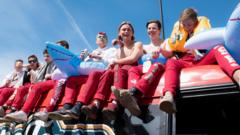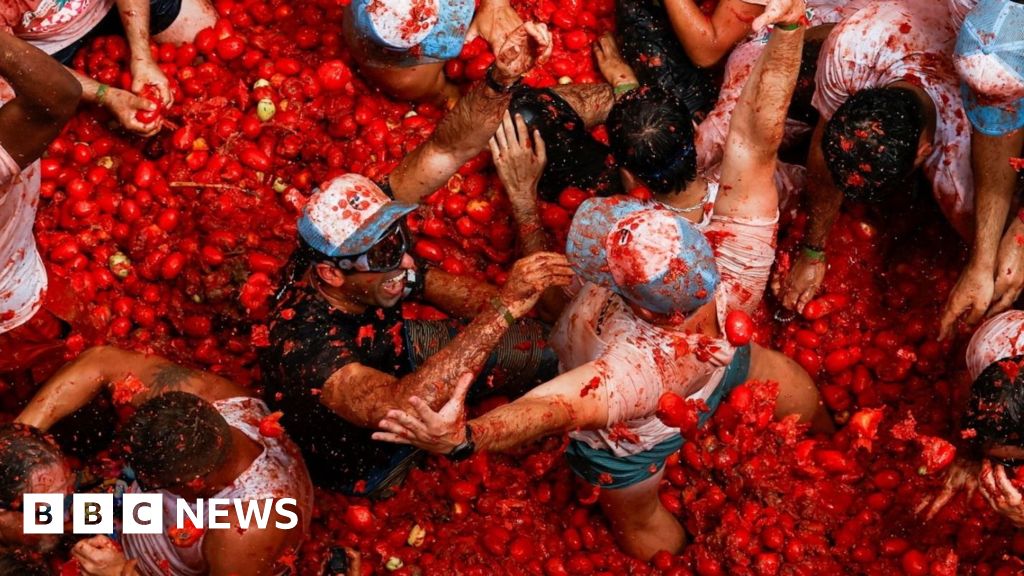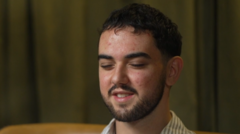Article text:
Norwegian school leavers, known as "russ," are making headlines as their end-of-school celebrations in party buses draw scrutiny from parents and politicians. The iconic scene of students donning red overalls, running to catch the metro, signals the start of a month-long celebration that culminates on Norway's national day, 17 May. However, this year, alarm bells are ringing as many young Norwegians are starting their festivities weeks before final exams, raising questions about the impact of these celebrations.
Selma Jenvin-Steinsvag, an 18-year-old student, along with her classmate Aksel, is part of this year's russ tradition. "After that, all our written exams will be done," Selma shared, as the excitement builds. Yet, a distinctive aspect of the celebrations, the "russebuss" or party bus, has stirred concern due to its association with heavy drinking, drug use, and lack of sleep among students.
19-year-old Edvard Aanestad, from Oslo, described the allure of the russebuss: "We go out every night for a month, we get drunk... it's just fun!" This celebration culture is not only costly, sometimes requiring students to go into debt for decorations and rentals, but it also prompts serious concerns from parents about its impact on teenagers' health and academic performance during their examination period.
Prime Minister Jonas Gahr Støre acknowledged the excitement surrounding graduation but noted that the party bus culture had spiraled out of control, emphasizing the urgency of concerns raised by parents, teachers, and community leaders about the wellbeing of youth.
Parents like Solveig Haukenes Aase highlighted that the festivities are also affecting younger students, urging a reconsideration of how school authorities view the celebrations. Aase and her community group aim to promote a safer environment for teenagers by advocating for a shift in the attitude of educators towards the long-standing tradition.
Norway's Minister of Education, Kari Nessa Nordtun, pointed out that the overlap between celebrations and examinations has contributed to declining academic performances. She reaffirmed the need for a more inclusive and financially manageable graduation celebration, suggesting a shift towards post-exam festivities.
Traditionally, the russebuss phenomenon, which emerged in Oslo in the 1980s, has morphed into a widespread national trend, drawing attention to the luxury and exclusivity of many party groups. Criticizing the commercialization, Ivar Brandvol noted that some groups spend excessively on their celebrations, leading to social exclusion for those unable to afford participation.
With rising worries about teenage safety during these extravagant events, the government has moved to restrict the use of converted buses for future russian celebrations, prompting mixed reactions from students. Edvard Aanestad, alongside his friend Henrik, feels that proposed changes could exacerbate social exclusion.
As the debate continues, the government's intervention reflects a broader concern for the safety and well-being of Norway's youth, posing vital questions about balance in celebrations, inclusivity, and responsibility in the context of a cherished national tradition.
Norwegian school leavers, known as "russ," are making headlines as their end-of-school celebrations in party buses draw scrutiny from parents and politicians. The iconic scene of students donning red overalls, running to catch the metro, signals the start of a month-long celebration that culminates on Norway's national day, 17 May. However, this year, alarm bells are ringing as many young Norwegians are starting their festivities weeks before final exams, raising questions about the impact of these celebrations.
Selma Jenvin-Steinsvag, an 18-year-old student, along with her classmate Aksel, is part of this year's russ tradition. "After that, all our written exams will be done," Selma shared, as the excitement builds. Yet, a distinctive aspect of the celebrations, the "russebuss" or party bus, has stirred concern due to its association with heavy drinking, drug use, and lack of sleep among students.
19-year-old Edvard Aanestad, from Oslo, described the allure of the russebuss: "We go out every night for a month, we get drunk... it's just fun!" This celebration culture is not only costly, sometimes requiring students to go into debt for decorations and rentals, but it also prompts serious concerns from parents about its impact on teenagers' health and academic performance during their examination period.
Prime Minister Jonas Gahr Støre acknowledged the excitement surrounding graduation but noted that the party bus culture had spiraled out of control, emphasizing the urgency of concerns raised by parents, teachers, and community leaders about the wellbeing of youth.
Parents like Solveig Haukenes Aase highlighted that the festivities are also affecting younger students, urging a reconsideration of how school authorities view the celebrations. Aase and her community group aim to promote a safer environment for teenagers by advocating for a shift in the attitude of educators towards the long-standing tradition.
Norway's Minister of Education, Kari Nessa Nordtun, pointed out that the overlap between celebrations and examinations has contributed to declining academic performances. She reaffirmed the need for a more inclusive and financially manageable graduation celebration, suggesting a shift towards post-exam festivities.
Traditionally, the russebuss phenomenon, which emerged in Oslo in the 1980s, has morphed into a widespread national trend, drawing attention to the luxury and exclusivity of many party groups. Criticizing the commercialization, Ivar Brandvol noted that some groups spend excessively on their celebrations, leading to social exclusion for those unable to afford participation.
With rising worries about teenage safety during these extravagant events, the government has moved to restrict the use of converted buses for future russian celebrations, prompting mixed reactions from students. Edvard Aanestad, alongside his friend Henrik, feels that proposed changes could exacerbate social exclusion.
As the debate continues, the government's intervention reflects a broader concern for the safety and well-being of Norway's youth, posing vital questions about balance in celebrations, inclusivity, and responsibility in the context of a cherished national tradition.



















